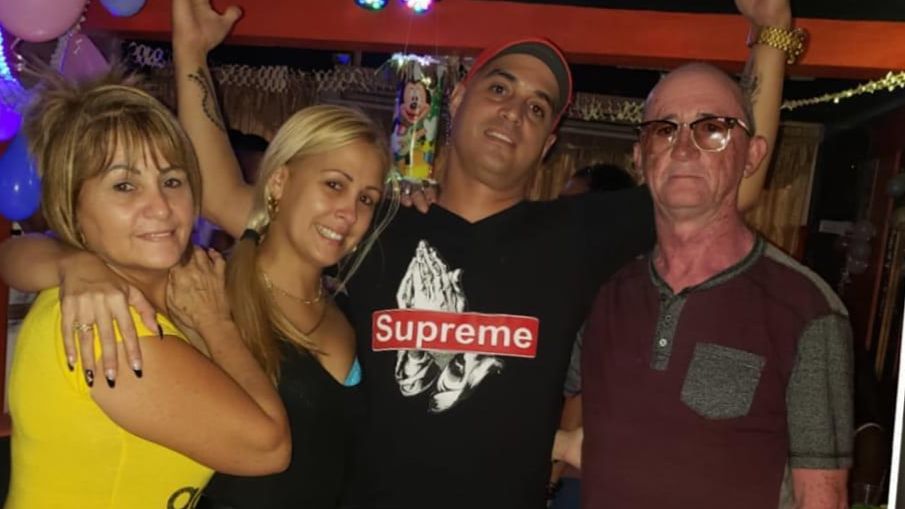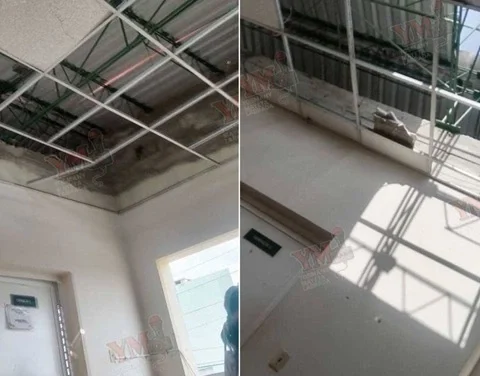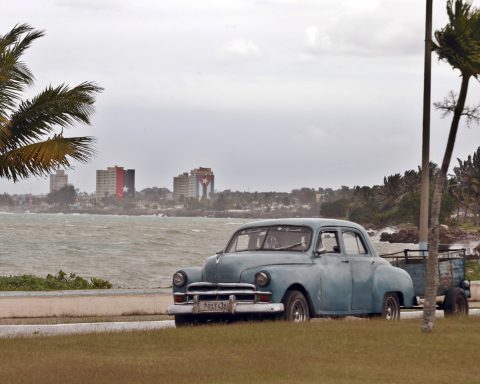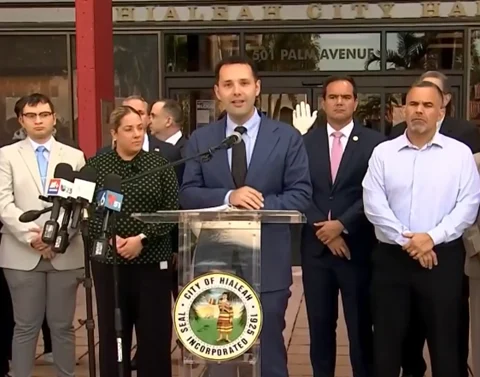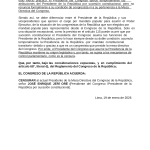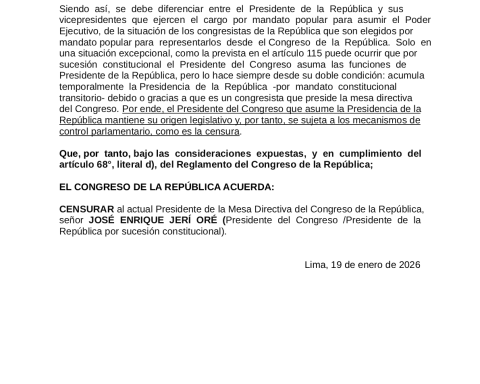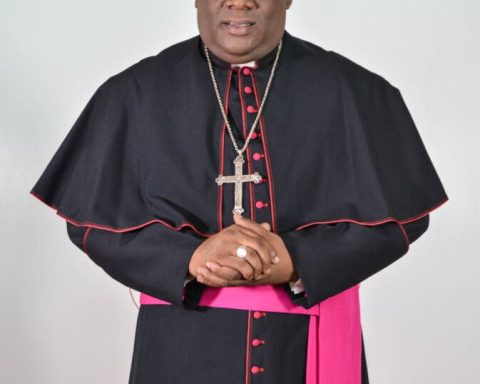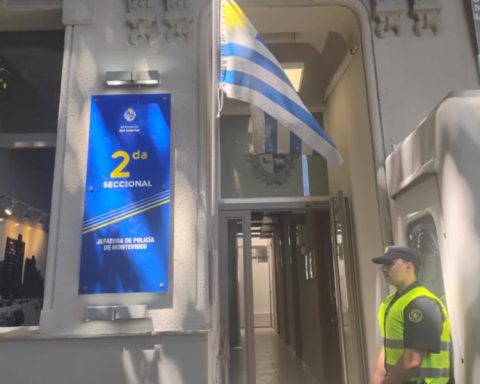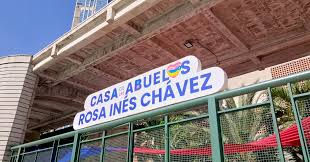MEXICO CITY.- Zoila Rodríguez has reached the age of 60 feeling very afraid of getting old, of not being able to get up and go out to look for food, that her circulation will worsen and her legs ache, of death. But she does not fear for her, what terrifies her and does not let her sleep well is that if she misses her or gets sick, what will happen to her children and her ex-husband, who will take care of her grandson .
When her children Katia and Exeint Beirut, along with Fredy Beirut, their father, were arrested for demonstrating on July 11 and 12, Zoila thought that they would spend a few days in jail and then they would be released. They hadn’t done anything serious. However, nine months have passed and all three are still in jail.
Exeint (41 years old), detained in Guantanamo, where he lives, will be reunited in three years and three months with his wife and teenage children. And of course, every day he spends in jail is an ordeal for his mother, but seeing the sentences – some exceed 25 years – imposed on other protesters, a sentence of four may seem like a gift.
Instead, Zoila cannot feel the same “relief” when she thinks of Katia (36 years old) or Fredy (64 years old), accused of sedition and sentenced to 20 years in prison. Katia, ill and with two children, is among the women with the greatest penalties of 11J; and Freddy is one of the oldest people sentenced to prison for the riots that shook all of Cuba.
The Beiruts did not go out for food
Exeint Beirut, owner of a carpentry workshop in Guantanamo, went out on July 11 to demonstrate with his two eldest sons, then 16 and 17 years old. That same day they arrested him with his daughter and beat them both. The girl was dragged down the street and Exeint was hit in her abdomen and leg. A day later, in Havana, her sister Katia and her father Fredy came out to protest, furious at what had been done to them.
The Beiruts, owners of a restaurant and other businesses, unlike the majority of the protesters in La Güinera, are not poor people, and they did not go out to ask for food. When it is said that the demonstrations in July had only an economic motive and respond to the crisis and the sanctions of the United States, we must think of this family. The Beiruts had a way to feed their children, unlike their neighbors they have a comfortable house and survived without hardship. During the peaks of the pandemic, Katia prepared food from her business and sent it to the elderly for free. If the Beiruts left in July, they went to ask for freedom, first for Cuba and then for their family.
On the 12th of that month in La Güinera, Katia and her father walked with other defendants, “shouting counterrevolutionary slogans” and “more people joined them indiscriminately,” the prosecution said. “They expressed denigrating phrases against the direction of the country.” In her case, she had the aggravating circumstance of having broadcast a few minutes directly from her networks. The prosecution accused her of “publishing everything that was happening and thus getting more people to join them.”
Despite the fact that the same body recognized that they did not participate in violent acts: “Consistent, satisfied and having achieved their goal of making this whole mob become aggressive, they withdrew to their respective buildings,” they were prosecuted for sedition.
“Fredy, since they were taken away, told me that they were going to be melted down in years, that the government didn’t believe in anyone and they only cared about power,” says Zoila. His ex-husband, the son of an Arab emigrant whose land was practically expropriated by the government in the 1970s to build a highway, did not expect anything else from the regime that it has done: exemplary convictions so that no one even thinks of leaving new.
“With my daughter there are 29 more women prisoners of 11J. How many mothers and children are suffering now? I myself have five grandchildren who have one of their parents in prison. What can those boys feel when they talk to them about the goodness of the Revolution in the schools and tell them “Homeland or Death”?
“If before there were people who criticized the short government to stay out of trouble, that has multiplied. We are many families and friends hating them with all our might. They are criminals and have no forgiveness. Not even Batista gave such high sentences to those who assaulted the Moncada, ”says the mother of the Beiruts in audios that she sends on WhatsApp with her voice broken and crying.
Since her family was imprisoned, Zoila’s life has been summed up by going out on the street and looking for what she needs to fill the three crates, take care of Luis, Katia’s nine-year-old son, help her son-in-law in the family business and travel every month to Guantánamo. At 60 years old, she travels more than 800 kilometers in whatever appears: train, bus, trucks. She doesn’t care how to get there, as long as she is visiting her son. She makes the trip with a briefcase on her back that she fills with what she bought in Havana.
“I am in the middle of everything”
Since my family is in prison I don’t turn on the television because they disgust me. It’s one lie after another as if we were fools. In each space they say that all the prisoners were judged according to the seriousness of what they did, but that is false. Twenty years is the penalty for a murderer, not for someone who takes to the streets in a demonstration without harming anything or anyone.
In March, when they reported Katia and Fredy’s conviction, her daughter called her screaming uncontrollably, desperate. She told him over and over again how they were going to hold her prisoner for so long, what would happen to her children.
Katia has been very sickly since she was a child and that is another cause for concern for her. She has suffered from chronic gastritis since she was nine years old, her platelets are low, she has a migraine attack and was operated on for cancer. In prison, moreover, she has felt pain in one breast and they have not treated her.
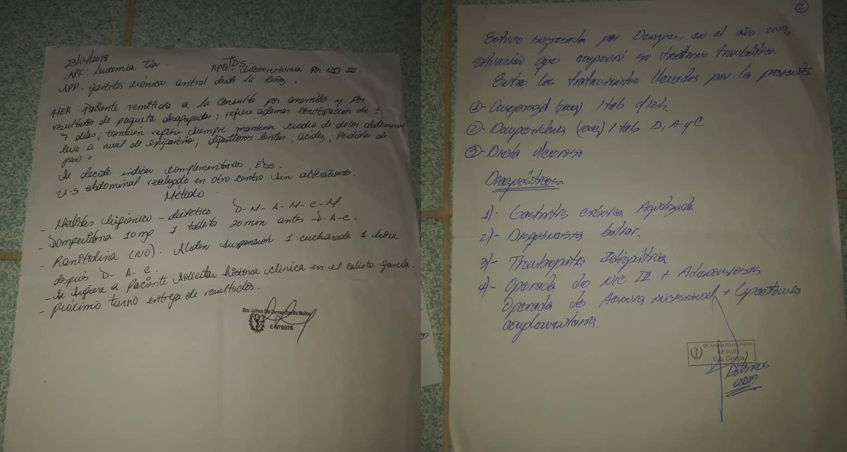
Neither has there been medical care for Fredy in prison. He arrived at the Eastern Combination with a broken tooth and apparently a rib, as a result of the blows they gave him when he was arrested, and no specialist has treated him yet.
Fredy Beirut suffers from vitiligo (a condition in which the skin loses its pigment cells) and his epidermis is badly damaged by prison conditions. In addition, an injury broke out on his face and they have told him that there are no medications to treat him.
“Although he and I are separated, he was my husband for over 30 years and we still lived together. I can’t stop crying when I think that he feels bad and is alone there without the care of the family we form. Working so much in life to have a peaceful old age and now spending his last years in prison, that’s cruel. Exeint in every call and visit he asks for his dad. He is afraid that something will happen to him and we are hiding it from him.”
Since her family was arrested, Zoila has not stopped sending letters to every institution she can think of: courts, Assembly, Council of State. He has also given interviews, continuously denounces him from his networks, and has followed the legal channels to claim the sentences. “I feel like I’m hitting a wall that doesn’t move with my body, that it’s impossible, but I can’t give up and I’m not going to shut up.
“They sent two State Security agents to my house to warn me not to participate in any demonstration of the mothers. Supposedly it could make everything worse. But what could be worse, if the three most important people in my life were taken from me in a moment.
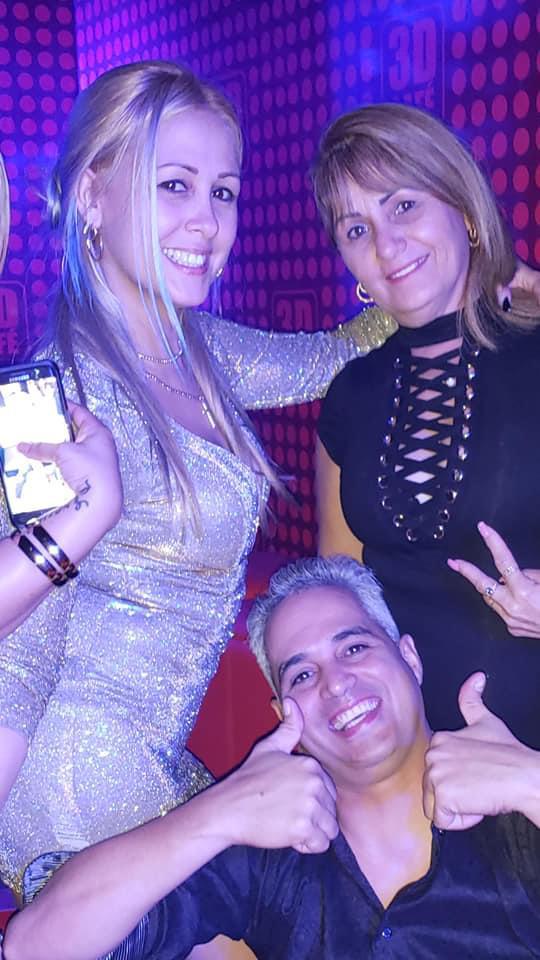
“I have been in the middle of everything, taking care of the prisoners and those who are outside. Every day I find the strength to get up because my nine-year-old grandson needs me. Since his mother is in jail, an intelligent boy who liked school, he doesn’t want to go to class. He asks me what a demonstration is, why it is a bad thing. He asks me if 20 years is a long time. I try to answer but I can’t tell him the whole truth either because later they say at school that I’m manipulating him against the Revolution.
“Katia’s eldest son is also very affected. He is 20 years old and does not want to go out with his friends. I think he feels powerless because he doesn’t know how to help his mom. I have had to forbid him to say or do anything. I can’t let them put him in jail too. To make and denounce I am. During this time I have lost weight and all the ailments of old age have intensified, but if death comes to me, it will find me demanding the freedom of my family. When you have to take care of so many, you don’t have time to take care of yourself.”
Zoila has thought about closing her daughter’s restaurant in La Güinera. Maintaining a business like this without buying some product from the “left” is practically impossible in Cuba. And she fears that now her family will be targeted by State Security and they will use the business as a bargaining chip to silence them.
Even if they are left without their main livelihood, they value selling the premises and living for some time on that money. Right now her priority is to get Exeint, Fredy and Katia out of jail, and she doesn’t want anything to limit her or endanger those who are released. If this is not achieved, when her daughter completes her sentence, Zoila will be 80 years old. And Freddy, if he survived, would return home with 84.
Receive information from CubaNet on your cell phone through WhatsApp. Send us a message with the word “CUBA” on the phone +1 (786) 316-2072, You can also subscribe to our electronic newsletter by giving click here.
